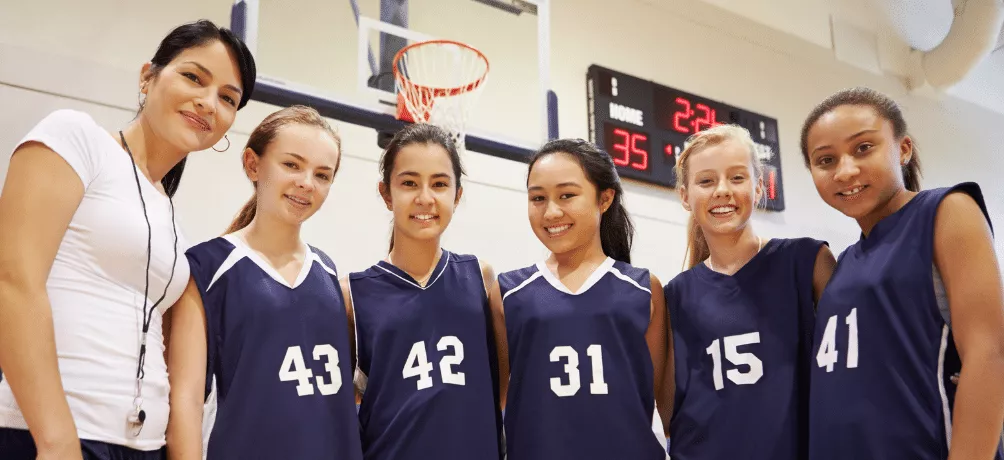ADHD and Sports – Tips for Coaches and Parents
By Dr. Mary Rooney, Ph.D.
Participation in extracurricular activities is an important part of growing up for all kids, and it may be especially important for kids with ADHD. Extracurricular activities provide kids with ADHD with the opportunity to develop skills and connect with kids around activities and interests that they are passionate about, in settings that are often less stressful for them than an academically focused classroom environment. When extracurricular activities include sports, kids with ADHD also benefit from the structured and rule-oriented nature of practices and games, and from the much-needed physical activity that sports provide. In fact, research has shown that participation in sports can reduce symptoms of anxiety and depression and can lead to improvements in ADHD symptoms. These improvements are seen across all sports, including individual sports, team sports, and martial arts.
While sports participation is a definite win for kids with ADHD, it can be difficult for coaches to know how to support a child with ADHD during practices and games. Unfortunately, most coach development programs provide little or no training on coaching kids with ADHD. As a result, parents often find themselves in the position of having to advocate for their child to make sure they are fully included in practices and games. Fortunately, the same behavior management strategies that work for kids at home and at school also work during practice and games. Here are five simple strategies that coaches can use to support kids with ADHD:
- Keep instructions brief and simple. Kids with ADHD can only hold one or two instructions in their mind at a time. In general, the less time kids with ADHD spend listening to instructions and the more time they spend moving and playing on the court or the field the better they will do during practice.
- Praise and reward positive behavior. Name three positive behaviors that you want to see during every practice or game. Be very specific when describing these behaviors, and have the child repeat the description back to you so you can confirm that they understand. Review these behaviors at the start of each practice or game and praise the child often when you see them meeting the expectations. You can also consider giving the child points for ‘good behavior’ throughout practice along with a reward when they reach a predetermined point goal.
- Set kids up for success. Look for things that consistently lead to higher levels of inattention or disruptive behavior and plan to intervene before the problem starts. For example, separate the child from problematic teammates, minimize the amount of time they spend playing certain positions, rotate positions often if the child loses interest or motivation, provide frequent water and snack breaks (hunger and dehydration make ADHD symptoms worse), etc.
- Provide individualized attention whenever possible. With many kids to coach on a team, it can be hard to carve out one-on-one time with a child. But even small amounts of individualized coaching can go a long way for kids with ADHD. Small doses of one-on-one coaching can help kids understand instructions more clearly, can help them feel more connected with their coach, and can help coaches develop a better understanding of the child’s needs.
- Use negative consequences sparingly. Negative consequences are only truly effective when they are used sparingly and in combination with positive consequences (like rewards and praise). So, reserve the use of negative consequences/punishment for unsafe or highly disruptive behaviors.
When coaches and parents work together, kids with ADHD can succeed during practices and games. So, when your child starts with a new team, introduce yourself to your child’s coach right away. Let them know that your child has ADHD and share the strategies that work best for them. Coaches are often happy to have this information, and if the coach doesn’t respond well then it may be a sign that they aren’t the right fit. As a parent you know your child better than anyone. When you partner with the right coach you can create a positive sports experience that will allow your child to thrive.
ABOUT DR. MARY ROONEY
Mary Rooney, Ph.D., is a licensed clinical psychologist in the Department of Psychiatry at the University of California San Francisco. Dr Rooney is a researcher and clinician specializing in the evaluation and treatment of ADHD and co-occurring behavioral, anxiety, and mood disorders. A strong advocate for those with attention and behavior problems, Dr. Rooney is committed to developing and providing comprehensive, cutting edge treatments tailored to meet the unique needs of each child and adolescent. Dr. Rooney's clinical interventions and research avenues emphasize working closely with parents and teachers to create supportive, structured home and school environments that enable children and adolescents to reach their full potential. In addition, Dr. Rooney serves as a consultant and ADHD expert to Huntington Learning Centers.
ABOUT HUNTINGTON
Huntington Learning Center is the tutoring and test prep leader. Its certified tutors provide individualized instruction in reading, phonics, writing, study skills, elementary and middle school math, Algebra through Calculus, Chemistry, and other sciences. It preps for the SAT and ACT, as well as state and standardized exams. Huntington programs develop the skills, confidence, and motivation to help students of all levels succeed and meet the needs of Common Core State Standards. Founded in 1977, Huntington's mission is to give every student the best education possible. Call us today at 1.800.CAN LEARN to discuss how Huntington can help your child. For franchise opportunities please visit www.huntingtonfranchise.com.
This website does not provide medical advice, diagnosis, or treatment. The material on this site is provided for educational purposes only.


